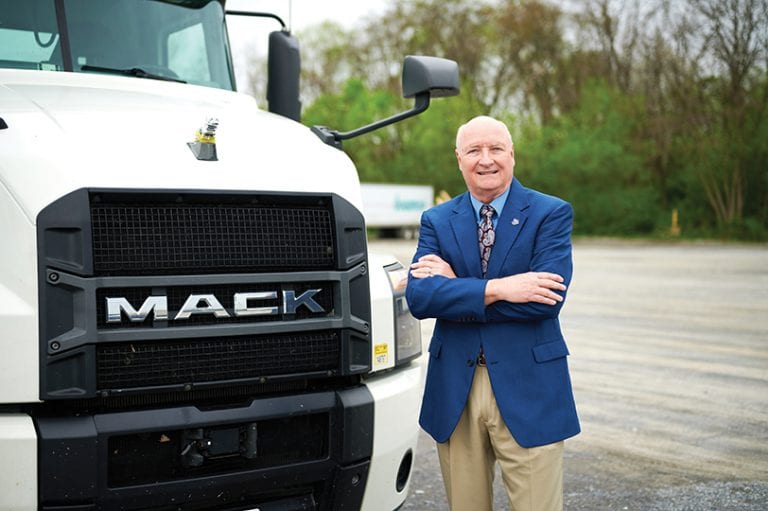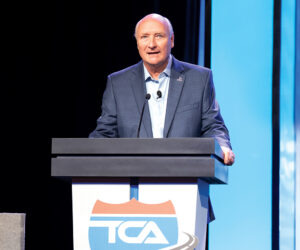During his 30 years in trucking, Truckload Carriers Association Incoming Chairman Jim Ward says he’s watched the industry transition through three interesting cycles. During the first of these cycles, professional truck drivers were seen as the “knights of the road,” professionals delivering America’s goods and lending a helping hand to the general public when in distress. Then came the stigma following the Burt Reynolds movie “Smokey and the Bandit,” which led to a public image of drivers as bad guys, cheaters, thieves, and worse. Then came the COVID-19 pandemic that restored trucking’s image and the nation’s recognition of trucking’s “essentiality” in keeping America moving. As he assumes the TCA chairmanship, Ward calls on the industry to seize the moment and make sure everyone understands how vital trucking is to ensuring the shelves are stocked with bread, milk, and — yes — toilet tissue.
Congratulations on becoming chairman of the Truckload Carriers Association (TCA). What does it mean to you to be chairman?
It is an honor, and I am very appreciative to have the opportunity to serve as the 90th TCA chairman. There are a number of people I have to thank who have been instrumental and supportive of me on my journey to the chairmanship. First, Don Bowman. Without his belief in myself and TCA, this would have never happened. Second, the leadership team at D.M. Bowman, whom I have always been able to rely upon. Third, the friendship and support of the TCA past chairs, and finally, my wife and best friend for over 40 years, Starla, who has supported me and the family throughout my career. I could not have done it without her.
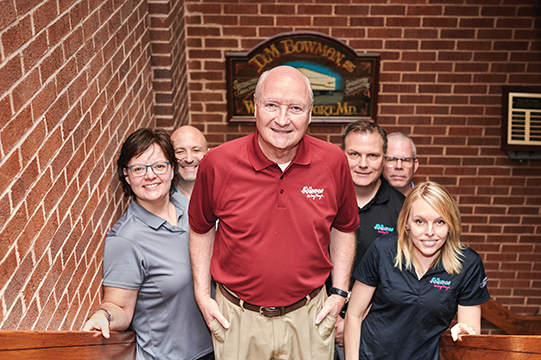
Can you tell the membership a little about your career in trucking and about the company you lead, D.M. Bowman?
Trucking has been very good to me and my family. I went to work for Don Bowman in January 1986 as a safety supervisor. We were growing at that time, so your role and responsibilities were quite broad, no matter your title. Risk mitigation, driver hiring, orientation, dispatch … we did whatever it took to service the customer and keep our drivers moving safely. With growth came opportunity, and one day, Don approached me about establishing and leading a human resources department. Those same risk mitigation skills were transferable from the highway to the corporate office: employee development and welfare, training, group health negotiations, establishing profit sharing, and the introduction of an employee handbook. I was then promoted to vice president of quality, and I became CEO in 1999 then later president and CEO.
Over the past 60 years, D.M. Bowman, Inc., has grown from an irregular route, common contract truckload carrier to a logistics company operating a diverse fleet of equipment (vans, flat, bulk tanker, and containers) and managing a couple million square feet of warehouse space, providing non-asset-based brokerage services to assist customers with peak season demands.
In your acceptance speech at the recent virtual Spring Business Meetings, you said you have experienced the platform that membership in TCA offers, and that justifying dues to TCA was a simple endeavor. What has TCA meant to you and your company?
We have always found value in being an active member of TCA, where we can network with like-minded people who are confronted with many of the same challenges in operating a motor carrier. Trucking is a complex and difficult business, so I’ve always found it helpful to be able to pick up the phone and call a TCA member to obtain insight on how they approached a similar challenge. Over the years, I have also received these calls, and have shared whatever knowledge and experience I may have gained in the area of concern.

What is going to be your focus as chairman?
When you have been around the industry for 30-plus years, you realize that the issues confronting the industry don’t change a lot; they just seem to recycle. I remember attending a TCA annual meeting when Art Fulton was chairman in 1991-92, and his year was going to be centered around 18- to 20-year-olds driving interstate. The first time I remember hearing about the “essentiality” of trucking was during Dan England’s year as chairman in 1997-98. Don Bowman was ATA chairman 1995-96, and he promoted improving the image of our professional drivers. Don and Bill Webb from the Texas Trucking Association moved forward the adoption of the first Driver Appreciation Week. Finally, there is nothing more important to me than safety and making sure that we are good neighbors on our nation’s highways. All of these are important to our industry and still need our attention and support today. I plan to continue to build upon the initiatives our past chairmen have promoted and see they are reinforced with our customers, suppliers, associates, politicians, and the general public.
As you become chairman, what is your message to TCA members who are not actively involved in TCA conventions and programs?
To me, association membership is a lot like most things in life: “You tend to get out of it what you are willing to put into it.” Whether it’s relationships, family, work, or association involvement, to get a reasonable return on your financial investment one also needs to make a time investment. I understand everyone’s situation is different, but I am living proof that you don’t need to have all the answers to lead a successful business or transportation practice. You just need a great network of industry friends like Clifton Parker, Brit Colley, Rob Penner, Dennis Dellinger, and Dennis Morgan, to name a few, who you can pick up the phone and call to discuss your problem and get sound counsel to aid you in navigating any situation. TCA membership consists of many of these wonderful people; don’t miss out on building your network!
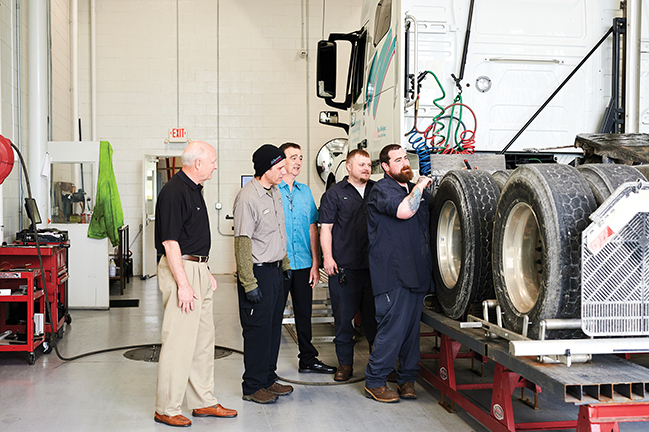
You have become chairman at a time when the nation has spent the past four years hearing about an infrastructure plan that never came to be. Now, President Joe Biden wants to spend $2.3 trillion on the country’s infrastructure, the definition of which goes far beyond highways and bridges. Why is the plan important at this point in U.S. history and, given the current partisan culture, what do you feel are its chances of passing?
I think we have all seen the reports over the years which have painted our roads and bridges in a negative light. Much like I referred to earlier, this issue is one that seems to continuously be recycled because we can never truly come to a resolution on it. The basic importance of this proposal is the investment in our roads and bridges, funding that is desperately needed to improve the efficient movement of freight and create a better workplace environment for our professional truck drivers. I am reluctant to lay out odds on the chance of something passing in Congress today, but I would think that infrastructure, at its very core, is an issue that Congress could rally around.
The plan includes about $115 billion to pay for fixing roads and bridges, prioritized by those most in need of repair. That includes 20,000 miles of the U.S. total 169,000-plus highways and roads, the 10 most “economically significant” bridges in the U.S., and 10,000 other bridges, 42% of which are at least 50 years old. Is this an adequate investment for highways and bridges?
I view our infrastructure in two parts: investment and maintenance. I realize $115 billion is not a small investment, and it is desperately needed to bring our roads and bridges up to the level that our nation should expect. However, the maintenance aspect of our infrastructure should be tied to the Highway Trust Fund, which is really the hard discussion that our congressional leadership needs to have. Creating a self-sustaining, long-term funding mechanism that supports the original investment is paramount to ensuring that we, as an industry, are not placed in this predicament again.
Of course, coming up with the $115 billion to pay for those needed improvements is a story within itself. Increasing the gas and diesel tax and/or implementing a vehicle miles traveled (VMT) tax seem to be the most discussed. What are the pros and cons of each, and where does TCA stand on those two possibilities?
Planning for this process is not an easy task. As a nation, we must engage in discussions that address the present shortfalls of infrastructure funding and plan for what the future holds. It is no secret that every vehicle, both trucks and passenger vehicles, are traveling farther on less fuel, but a fuel tax increase, at this moment, represents the simplest and most immediate way in which we can raise funding to support our roads. If 36 states can raise their fuel tax, it is difficult for me to understand why the federal fuel tax is off limits to be considered for an increase. However, as we see the creation of more environmentally friendly options that rely upon the notion of vehicle electrification, we would still need to explore options that accurately track the vehicle miles traveled on our roads to compensate for the lack of fuel consumption.
TCA supports an increase to the federal fuel tax as the most cost-effective way that dollars can be collected and distributed for important road and bridge projects across the country. In the long run, TCA staff is prepared to engage with Congress on the pitfalls of what a VMT tax looks like for the future. TCA’s Highway Policy Committee has done the lion’s share of work in developing these guidelines for our leadership to consider when continuing down this road of VMT implementation.
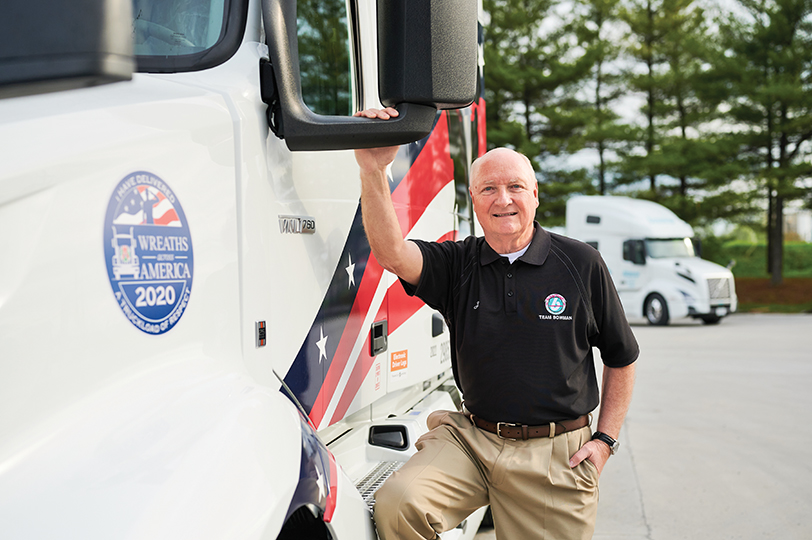
There are at least three key issues facing the trucking industry in 2021. Let’s look at them individually. First, there is partisan politics. If the Democrats and Republicans can’t get along, nothing can get done, including a new highway bill. What does this mean for trucking?
Regardless of partisan politics, TCA has worked diligently to represent the voice of truckload. We have a story to tell, and it is a good one. Our focus must remain on our professional truck drivers and the important job they perform. Acknowledging our driving force as essential is one thing, but creating an environment that recognizes the unique needs of these drivers should be the first action item this country undertakes. The recent global pandemic has highlighted that. As a nation, we faced shortfalls in PPE availability, vaccine distribution, and the assurance that store shelves were stocked with the essentials that every citizen needs. None of these things magically appear. They arrive on a truck, operated by a driver who has placed their health and this nation above partisan politics. I think everyone can agree that supporting the industry in this capacity is something that should be at the forefront of any political discussion.
Second, there is labor. One facet of the labor issue is protecting the independent-contractor model. What are your thoughts on this issue?
In 1959, some 62 years ago, D.M. Bowman started out when Don Bowman climbed into his B model Mack to haul coal. In 1966, the company obtained its ICC authority and joined TCA at just about the same time. In saying that, none of this would have happened without the availability of the independent contractor business model that exists today. Don had a dream to start a business, similar to the dream many TCA members had when their companies started out. It is imperative that we stand behind and support this path to achieving an American success story.
Third, there is the technology issue, including automatic emergency braking (AEB), cameras, and speed limiters, each of which could be legislated on the trucking industry. How do you feel about this technology and what it means for trucking?
We continually strive for highway safety improvements to reverse the trends in accidents on our roadways. Technology such as AEB, cameras, and speed limiters are devices that will aid in that effort. Our company and the industry have begun to embrace these devices because they move the needle on safety, and the results justify the investment. We will continue the trend of implementing tools in our trucks that prove through undeniable data that they can and do work. Additionally, we must continue to view the data generated by these devices to better our operations in terms of driver performance and enable ourselves to operate in the safest manner and with highest level of efficiency. I look forward to seeing what this technology holds for the future and personally believe it will continue to have a positive impact on our industry.
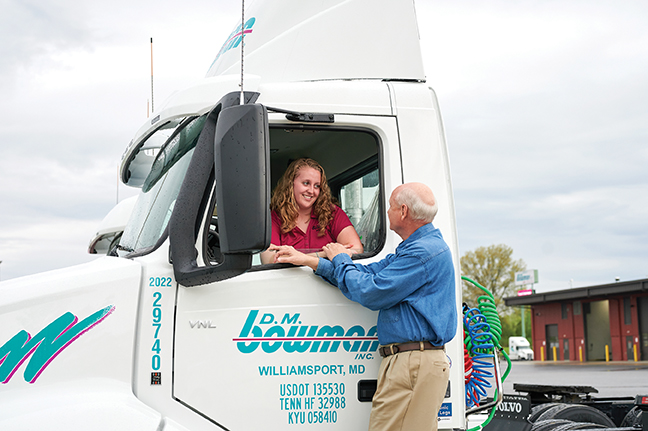
Four senators recently reintroduced the Promoting Women in Trucking Workforce Act. Why is it important to encourage more women to join the industry, especially as drivers?
Encouraging women to join our industry is important in expanding our nation’s driving force, but we should not just be viewing this issue by relating it to one demographic. We certainly support making the driving job better for everyone so that the attractiveness of this industry as a career will not only entice women, which have been growing as a percentage of drivers in our fleet, but anyone who strives to make a living in an environment that will be welcoming to everyone.
As you assume the chairmanship, what excites you most about the year ahead?
This is the easiest question yet. After the year we have just experienced, I am looking forward to returning to an environment where our industry can be in front of each other again. After 30-plus years in trucking, I have established lifelong friends and professional relationships that I highly value, and COVID-19 has hampered the ability to maintain those close connections in the manner to which we are accustomed. I view the year ahead as an opportunity to renew those relationships with the in-person meetings TCA is excited to offer, starting with the Truckload 2021 event scheduled for late September. I believe 2021 is going to be a great year for our industry, and I am looking forward to the TCA Chairman experience and seeing everyone in person again.
Lyndon Finney’s publishing career spans over 55 years beginning with a reporter position with the Southwest Times Record in Fort Smith, Arkansas, in 1965. Since then he’s been a newspaper editor at the Southwest Times Record, served five years as assistant managing editor of the Arkansas Democrat-Gazette in Little Rock and from November 2004 through December 2019 served as editor of The Trucker. Between newspaper jobs he spent 14 years as director of communications at Baptist Health, Arkansas’ largest healthcare system. In addition to his publishing career he served for 46 years as organist at Little Rock’s largest Baptist church.




